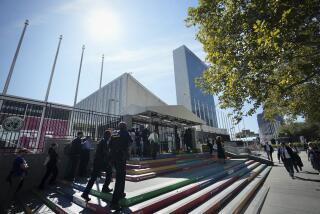U.N. Leader Heads for 11th-Hour Talks in Iraq
- Share via
BAGHDAD — After consultations with the French on Thursday, U.N. Secretary-General Kofi Annan is to arrive here today to meet Iraqi leaders for what might be the last chance to negotiate Iraq out of the cross hairs of a U.S.-British strike force poised in the Persian Gulf.
If Annan, who plans to spend the weekend in the Iraqi capital, cannot persuade President Saddam Hussein to back away from his resistance to United Nations weapons inspectors, it seems likely that the secretary-general’s visit merely will be the prelude to a deadly hail of missiles and bombs.
But U.S. officials, perhaps stung by the hugely public and embarrassing verbal brawl Wednesday at a Columbus, Ohio, “town meeting” over possible military action against Iraq, expressed more hope than in recent days for a diplomatic resolution to the inspections stalemate.
In Paris, French President Jacques Chirac, whose government has resisted the prospect of U.S.-led airstrikes intended to force Iraqi compliance with an international disarmament regimen, urged Hussein to heed Annan’s message of peace.
“I call upon Iraq to accept the proposals of the secretary-general of the United Nations because these are the proposals of the whole international community. . . . I hope that wisdom and reason will prevail,” Chirac said after meeting Annan at Elysee Palace. “I know Kofi Annan will do his best to maintain peace.”
Annan, who has characterized his mission as “the last hope before war,” said: “I hope to be in a position to convince Saddam Hussein to accept certain proposals which I will put to him to avoid a military strike.
“I have everything I need” in terms of negotiating authority from the U.N. Security Council, Annan said after meeting with Chirac for 45 minutes. “I think we can get an accord the Security Council can accept with no problem.”
Largely at the insistence of the Clinton administration, Annan is believed to be carrying what is close to a “take it or leave it” offer: Iraq must adhere to the terms of the cease-fire that followed the 1991 Persian Gulf War and cooperate fully with the U.N. weapons inspectors. That means no sites, including eight “presidential compounds” at the center of the current crisis, are off limits. The Security Council also has rejected Iraq’s proposal to restrict inspections of the eight sites to a single, 60-day period.
As a face-saving measure for Hussein, the United Nations is prepared to negotiate new procedures for investigating the presidential areas and give the regular inspectors some sort of diplomatic escort into the living areas at the sites.
The diplomats would come from the five permanent Security Council members--the United States, Britain, China, France and Russia--and perhaps from other countries.
But their precise role has been a matter of dispute in the council. The U.S. and Britain have insisted that the regular inspection team, led by Australian disarmament expert Richard Butler, not be made subservient to diplomatic escorts. Aides to Annan worry that the veneer of compromise in this council offer might be too thin for Hussein.
A senior European diplomat described this trip as a balancing act: “It’s a question of putting enough bells and whistles on the inspectors to satisfy Saddam, without compromising the freedom of inspections themselves,” the diplomat said. “It’s a fine line to walk, but it’s not impossible.”
As for the United States, President Clinton last talked with Annan on Wednesday before the secretary-general left for Iraq. Clinton reportedly expressed support for Annan’s mission but left him little room for negotiating with Hussein on the crucial issue of U.N. weapons inspections. The president has warned that the U.S. will reject any deal that in any way limits either the free and unfettered access of weapons inspectors to Iraqi sites or the independence of the inspectors themselves.
Although the tough U.S. stance leaves the prospects for a peaceful settlement largely in Hussein’s hands, White House aides saw more hope for a diplomatic solution than at any recent time.
Still, successful negotiations have eluded a parade of Russian, French, Arab and Turkish envoys who have met with Hussein and other top Iraqis in recent weeks.
Annan, before leaving New York, said he intends “to explain the situation very clearly and get [Hussein] to understand that it is in his best interest and in the interest of the Iraqi people to agree to implement Security Council resolutions.”
The Iraqis have not yet scheduled a meeting between Annan and Hussein. A U.N. advance party here was advised that Iraq will await the outcome of Annan’s talks Saturday with Deputy Prime Minister Tarik Aziz and Foreign Ministry officials before deciding on a session between the secretary-general and the secretive Iraqi leader. Still, “there is an assumption there will be a meeting [with Hussein],” a U.N. spokesman here said.
Times staff writers Tyler Marshall and Jonathan Peterson in Washington contributed to this report.
(BEGIN TEXT OF INFOBOX / INFOGRAPHIC)
Annan’s Team
U.N. Secretary-General Kofi Annan will take several senior advisers with him when he goes to Baghdad this week in an effort to avert a U.S. military strike.
Lakhdar Brahimi: a former Algerian foreign minister who has gone to Baghdad previously for Annan. He is not the secretary-general’s special envoy for Afghanistan.
Johan Molander: a Swedish foreign ministry official who was chairman of a U.N. conference on banning land mines. He also was a special adviser to Rolf Ekeus, former chairman of the U.N. commission in charge of Iraqi disarmament.
Hans Corell: the Swedish U.N. undersecretary-general for legal affairs
Rolf Knutsson: a Swedish senior official in Annan’s office.
Elizabeth Lindenmayer: executive assistant to Annan, from France.
Shashi Tharoor: executive assistant to Annan, from India.
Fred Eckhard: chief spokesman for Annan, from United States.
Source: Associated Press
More to Read
Sign up for Essential California
The most important California stories and recommendations in your inbox every morning.
You may occasionally receive promotional content from the Los Angeles Times.













